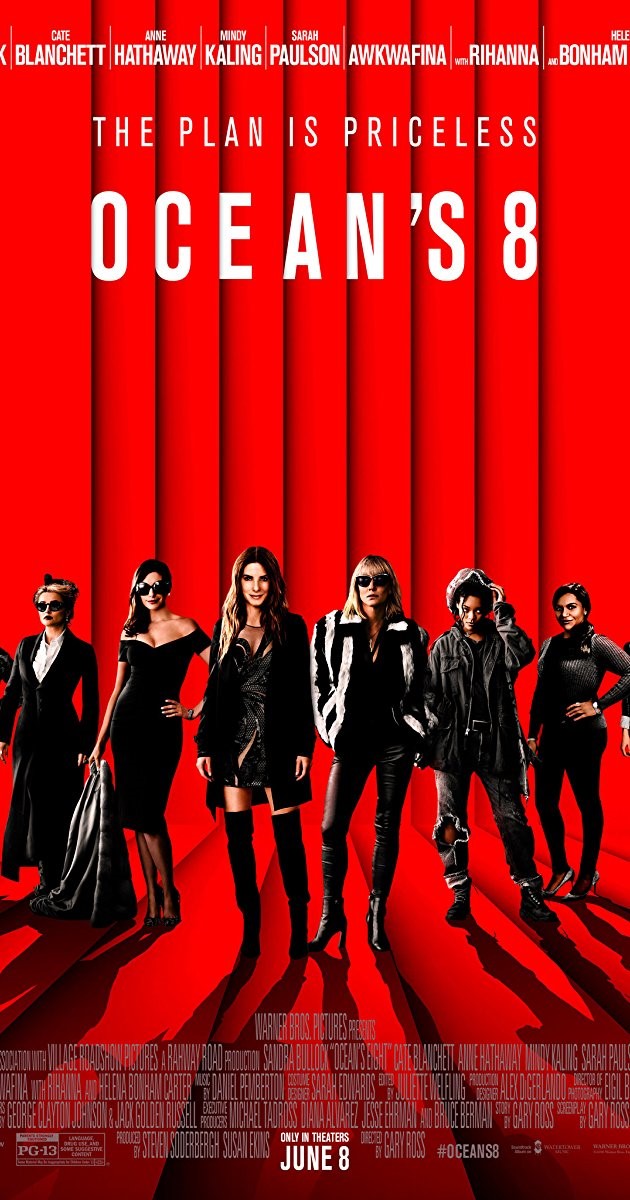By: Claire Bunn
Although movies provide a reprieve from daily life for millions across America, they also help to shape and showcase cultural values. In the wake of the #MeToo movement and an increasingly socially progressive stronghold in America, movies are changing, and the American public is showing up to the box office in support.
Ocean’s 8 featured all-female leads playing powerful roles as mastermind criminals and was a hit at the box office, bringing in $41.5 million in its opening weekend. The eight women portrayed diverse roles and races, bringing much needed representation to the big-screen in a movie by women, for women.
RBG was a groundbreaking documentary chronicling the life of Ruth Bader Ginsburg, Associate Justice of the Supreme Court, which made waves at the box office and held its own. Ginsburg’s story and early life will also be portrayed later on in the year in the docu-drama On the Basis of Sex, which will open the American Film Institute Festival on Nov. 8. The welcome reception of her documentary and eager anticipation for her movie signals a new respect for women in power and a long overdue celebration of their accomplishments.
One of the most anticipated movies of the summer, Crazy Rich Asians, featured a strong female heroine, as well as the first all-Asian cast to grace the box office in America, and proved that it could not only compete against more mainstream plot lines, but it could surpass them, grossing more than $161 billion since its opening weekend. Its success ushers in a new era in Hollywood, proving that larger representation and equality are not only tolerated, but wanted, by the American public and setting a precedent for more diverse casts and films.
The television industry is also making important strides, as 2017’s remake of Margaret Atwood’s famous feminist novel The Handmaid’s Tale, rises to popularity and 2013’s Orange is the New Black remains a Netflix staple. These shows that place women at the forefront of their story and manage incredible success help to showcase the many different portrayals of women in society.
Aside from fictional shows, television has also made important progress in journalism. CNN’s popular This is Life with Lisa Ling series has been airing since 2014 and National Geographic’s new 2018 series America Inside Out with Katie Couric both feature investigative female journalists covering some of the most pressing issues of our time and depict empowered women at the top of their fields.
Perhaps some of the most important strides made were in the children’s genre. The popular movie Incredibles 2 switched from the father fighting against crime to having his wife take the lead and save the world while he stayed at home to care for their children. The movie remake of Madeleine L’engle’s famous science-fiction novel A Wrinkle in Time featured Reese Witherspoon, Oprah Winfrey, and Mindy Kaling as Mrs. Whatsit, Mrs. Who, and Mrs. Which. This spike in female role models in children’s movies shows a cultural shift toward raising children with a more progressive mindset and a movement away from reinforcing typical gender roles for the youngest members of society.
Increasingly in children’s media, gone are the prince-saves-princess narratives, as newer princess movies like 2013’s Frozen focus on female empowerment and familial bonds rather than a dependence on men for success. This trend is also displayed in children’s literature as picture books like She Persisted: 13 American Women Who Changed the World and the Fancy Nancy series line the shelves of bookstores across the country rather than typical Cinderella stories.
Directors and writers should be respected for their courage and willingness to create art that is more representative of the American population and blazes a new trail, but America’s welcome reception of these films with strong female heroines is more important. This desire for material that empowers women echoes a rise in feminism after the #MeToo movement and an approval and celebration of strong women in non-traditional gender roles, which only seems to continue climbing as more and more women speak up for themselves and call for a celebration of equality and diversity. This progress is reassuring and marks real achievement. #MeToo and numerous women’s marches raised awareness of sexual harassment and women’s rights, but it is up to America to continue the women’s movement. Moving toward equal representation and using power in media to reshape the way our society views women and their capabilities is a good place to start.
Although the entertainment industry still has a long way to go in achieving a full celebration of American diversity, it is doing a much better job of telling the narrative of all Americans and reshaping cultural norms. As society progresses, the push for better representation must be continued, demanded by consumers and readily created by artists and producers. Hopefully, the rampant success of women-empowering content gives those in the entertainment industry a clue as to what America’s values currently are and what the public wants on the big-screen.
